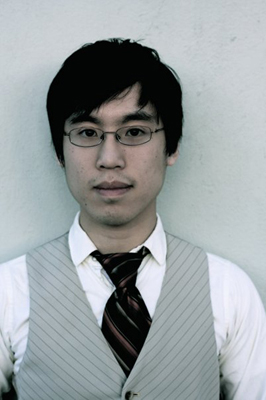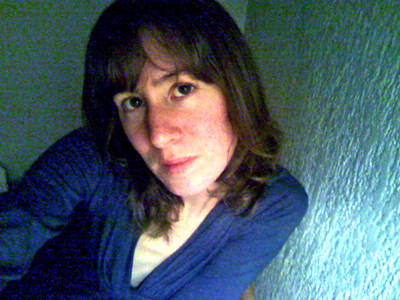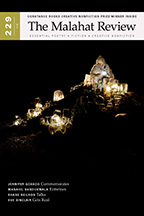Interviews
Tony’s Fictional Planet:
An Interview with Tony Tulathimutte
 Tony Tulathimutte talks with Malahat volunteer, Alicia Lawrence about “Brains,” winner of The Malahat Review’s 2010 Novella Prize, about what inspired him to write it, and about what inspires him in general.
Tony Tulathimutte talks with Malahat volunteer, Alicia Lawrence about “Brains,” winner of The Malahat Review’s 2010 Novella Prize, about what inspired him to write it, and about what inspires him in general.What is your relationship with the medical profession that inspired the subject of your story “Brains”?
My father and sister are doctors, my mother was a nurse, and I used to volunteer in an ER, plus I’m grimly familiar with the in-patient end of treatment—rather than topple Canada’s entire remaining forest wilderness for the paper it would take to list my complaints in print, I’ll just say brain surgery is one of the few medical trips I haven’t taken. So in a broad way, I’ve been observing doctors from the sidelines for a long time. But the novella was most directly conflagrated by an incident at my sister’s wedding reception, where I chatted with a young neurosurgeon who spun a few anecdotes about dropping bits of skull on the floor during operations, dropping stuff inside of patients, blaring Metallica, etc.
Her winning comment, the one that launched the novella, was that given the length of brain operations (often 8–12 hrs.), surgeons begin to adjust. They normalize to the extent that they begin running the familiar gamut of emotions one encounters in ordinary life, and so in the presence of an exposed brain, you feel random lust, irritation, doldrums; you smell electro-cauterized tissue and think about lunch. It was that idea of working directly on the physical instantiation of someone’s whole personality, while being off in your own head somewhere. Diana’s outlines were drawn: intellectually alienated, a contemptuous streak, and a certain desperate self-reliance. It seems obvious now that neurosurgery related very literally to issues of dualism, solipsism, education, and intellectual contempt; but while I was writing, I was just proceeding from that original image.
You humourously tease out some important issues surrounding the institutionalization of health. Do you have a philosophical position on this?
I don’t have any mind-blowing policy insights. What I am familiar with is the list of qualities required to learn and practise modern medicine: rigour, hardcore pragmatism, ironclad emotional boundaries, a hi-octane memory. While there are plenty of moral, compassionate, and sane doctors out there, morality, compassion, and sanity are not on the list. And so the protagonist Diana, who thrives in med school and the hospital, is also unable to absorb certain basic (and moreover intuitive) concepts of intimacy and empathy and theory of mind stuff, in spite of the recent gestures towards holistic practices and bedside manner.
A lot of the thinking around this novella came unwittingly out of Foucault’s The Birth of the Clinic. I hadn’t even read it until I’d finished the second draft, but it ended up being a very direct articulation of the ideas encompassed by Diana’s attitudes, and after finishing it I felt the gun-sights on me, aware that I was now in contested territory.
Do you envision the characters' messy personal lives as creating tensions and resistance that lurk beneath the surface of their professional careers, or rather, as contributing to an overall dynamic that shapes their lives and humanizes their practice?
The Death of Ivan Ilych was a model for the novella, and in the same way that Ilych is under the delusion that his “correct” conduct and awesome resumé somehow protect him from death, Diana sees her job as a pass from the obligations of life. She turns work into a surrogate personal and spiritual and artistic life, and so you have romanticized formulations like “blushing cauliflower” and “sacrament” et cetera. When her competence is challenged, she understands it as a pronouncement on her basic worth. Winning the malpractice battle becomes a way of affirming her sense of correctness.
Diana and Dr. Foster’s situations at home resemble one another, though Dr. Foster exploits the chaos that his self-interest produces. He’s a Good Doctor but a person in bad faith; other people are set dressing and supporting cast to him. Even his patients are not much more than occasions for the demonstration of his genius, big bloody Rubik’s cubes.
When you describe Dr. F's “telegeneric” face, you deftly illustrate a “performative” aspect of the medical profession. How do you feel that this is similar, and also different from, the writer's construction of a fictional character?
Physicians understand that if they don’t project competence and warmth, it can be much harder to get the cooperation they need to do their job properly, and they’re more likely to be accused of malpractice; they teach that now. Endangered people want to believe they have the sympathy of a higher power—if not an actual torch-winged divinity, then a group of impossibly smart, capable people with infinite resources who care about what happens to them. Some doctors are good at empathizing, some are good at faking it, some are neither. Creating a fictional character is a very different venture, because you’re inventing the face as well as the mask. And you’re not doing it to get people to like you.
Is Diana's character an alter ego of who you might have been, had you chosen a different career path?
Not really; or at least no more so than Simone. I lent her some of my own attitudes, and her character was developed around traits and behaviors very familiar to me—but with a few exceptions, there is usually a fat fictional buffer between my characters and me. Developing a character is a gene-splicing process, and my perfect chromosomal twins usually die hypoxic deaths in the thin atmosphere of my fictional planets. Diana has no humor, wit, or irony, is hell to get along with, has no exposure to pop culture or art, and is as brittle as a mummy. I'm her most passionate defender, but I’d want to date a funnier girl.
What do you enjoy most about writing?
When I’m able to enjoy it, I like the satisfaction of putting thoughts, experiences, people, and circumstances I care about into some kind of unique and concentrated coherence that eventually makes sense to me. You’re putting together a model of life in order to understand it. Is that enjoyable? All writing is wallowing, so the question hangs on what it is you’re wallowing in.
There are also what Ray Finch in Mortals calls “thought-gems”: those concise verbal formulations that get readers sprinting for a pen so that they can draw a star or adjacent line in the margin. When (if) you’re able to produce one of these, you’re usually more surprised than any reader would be. A reader might assume you know things he doesn’t, but you often see what you’ve written and think, I didn’t know that. So how the hell did I write it? There's this line from Mao II: “Every sentence has a truth waiting at the end of it...I begin to recognize myself, word by word, as I work through a sentence.”
Did you ever want to become a doctor?

Alicia Lawrence
My mother once said she didn’t care what profession I went into as long as I had an M.D. at the end of my name. There is no literary precedent in my family that I’m aware of, so writing was far upstream from where I started. I’m interested in medicine but I have subzero desire to become a doctor. As I partly editorialize in the novella, “Hospitals are certainly the least free places on earth.” Writing is a free place.









